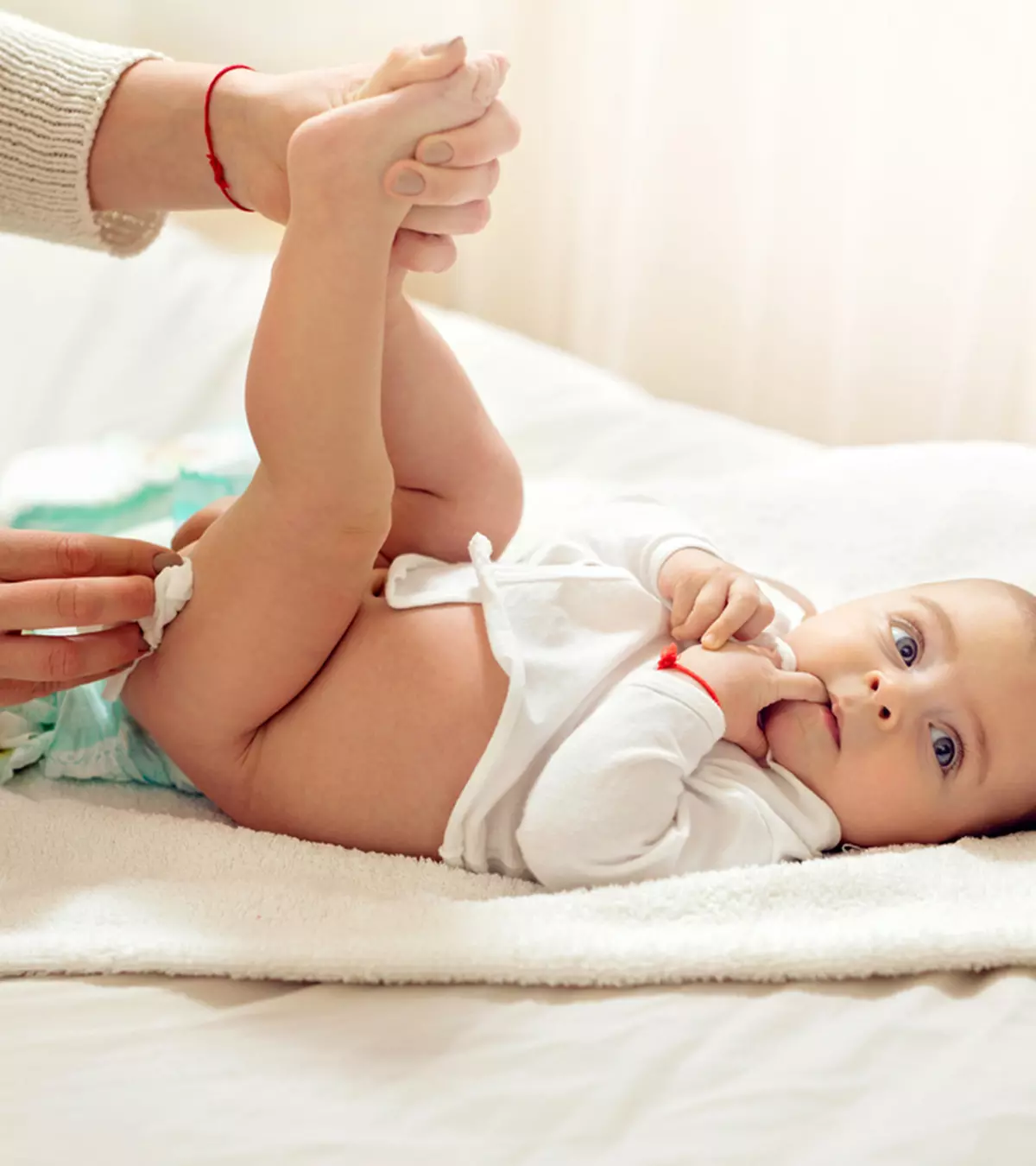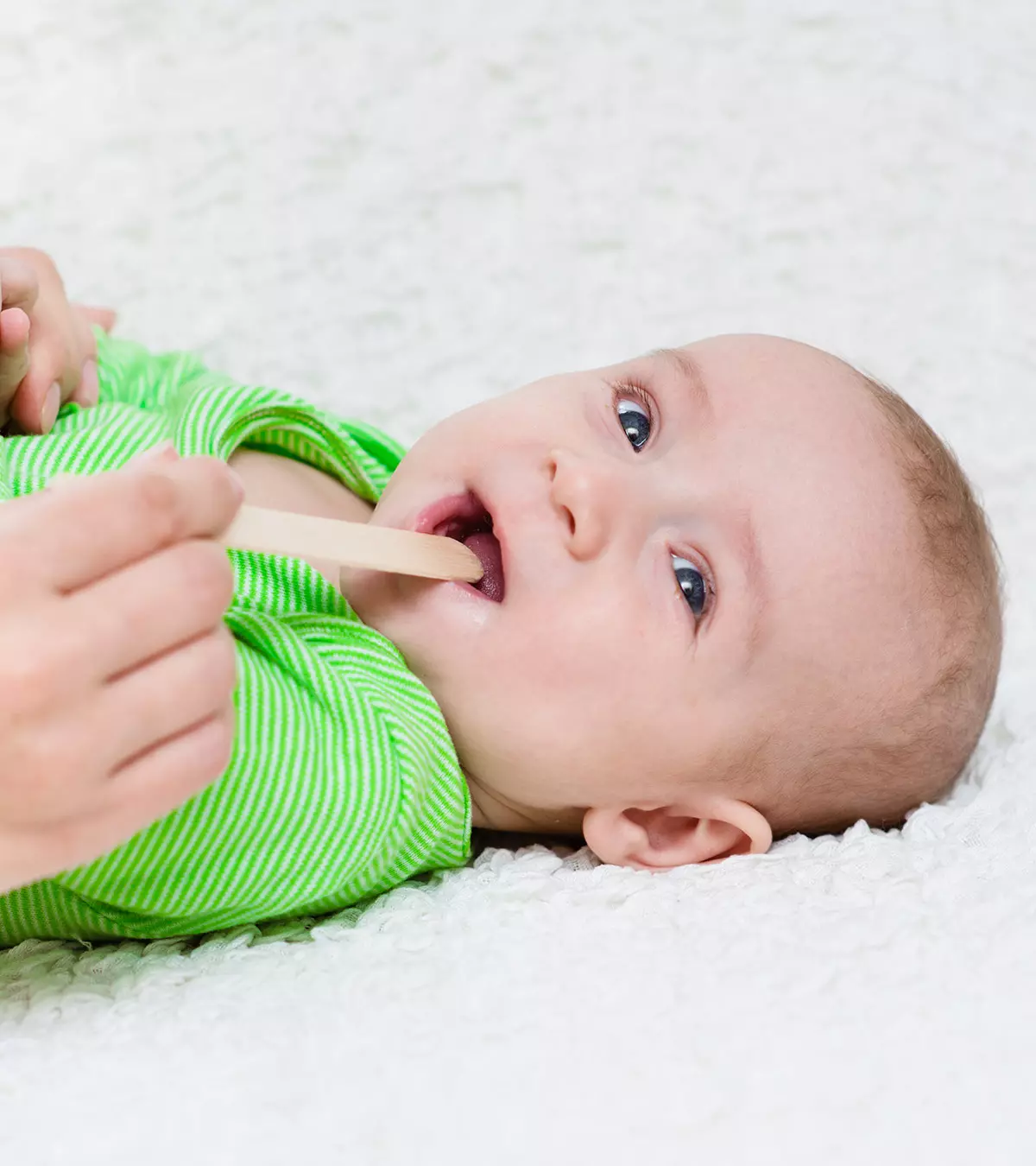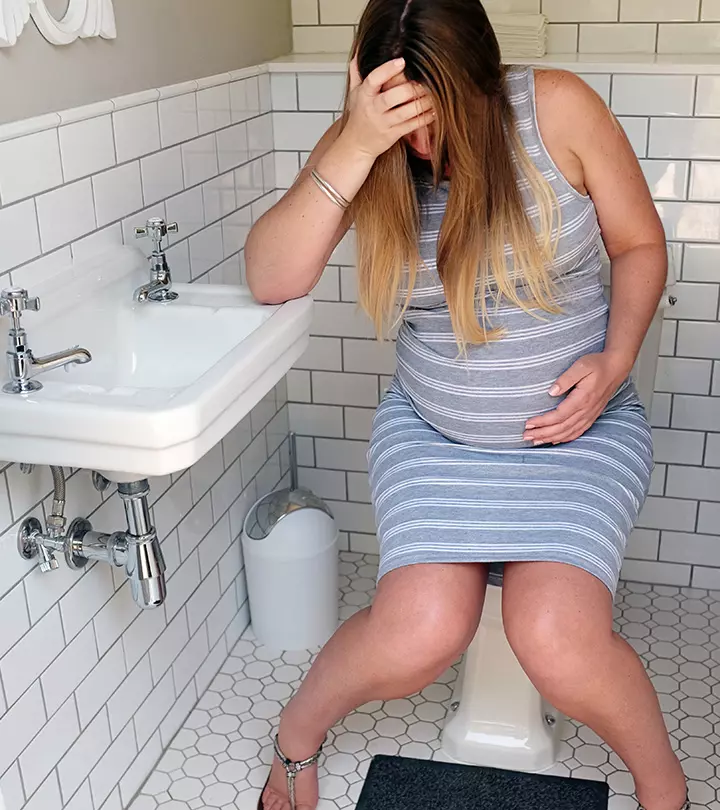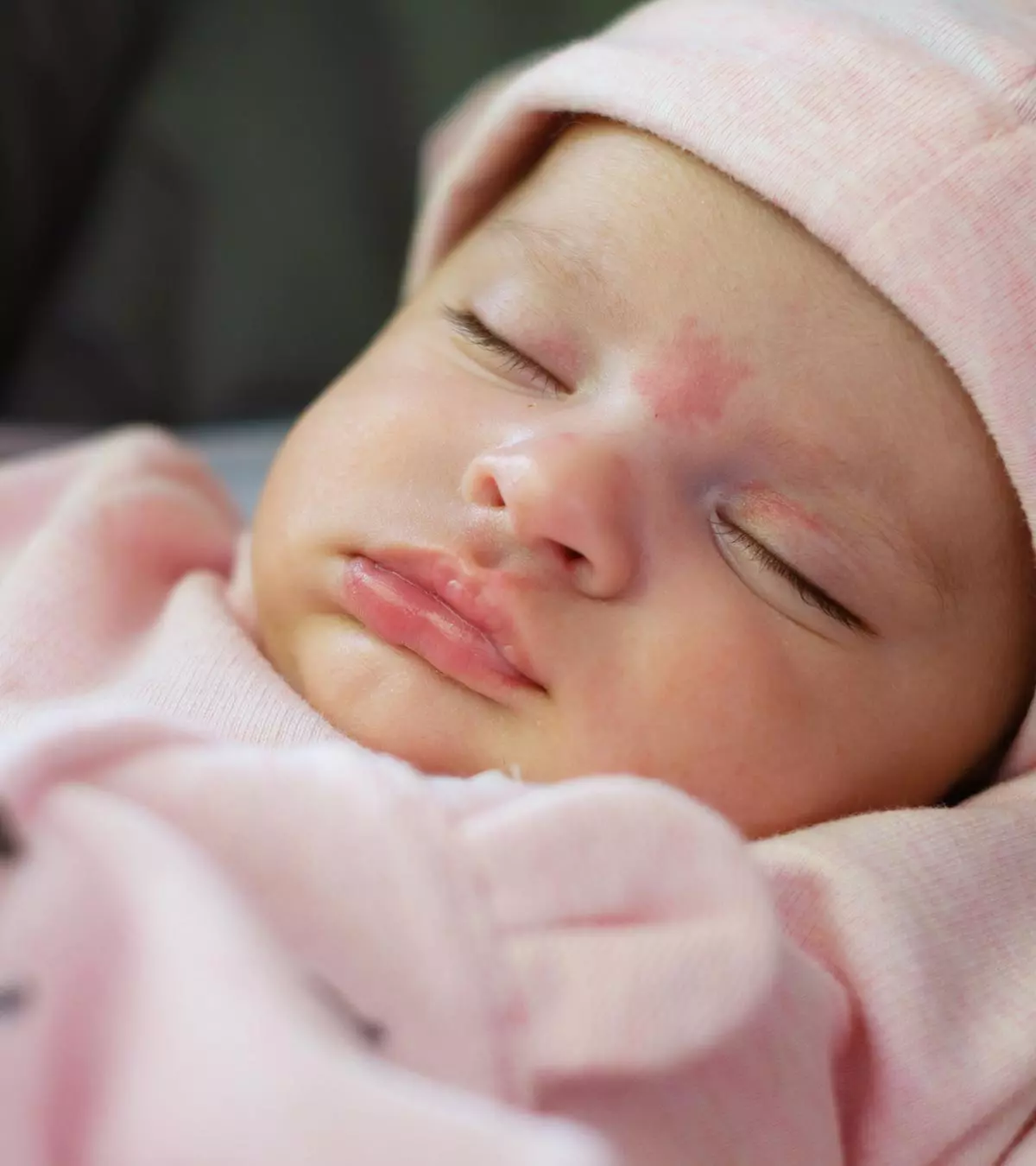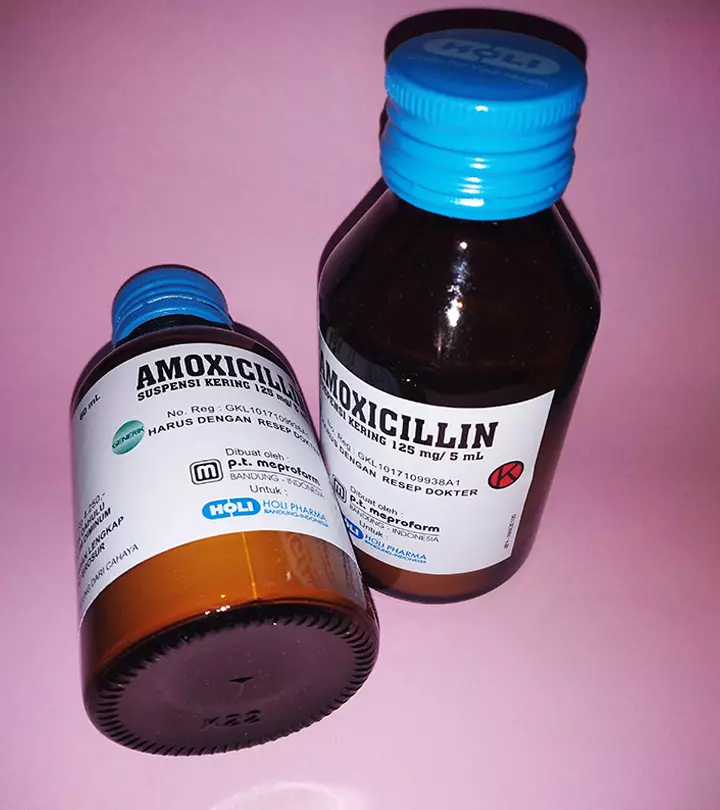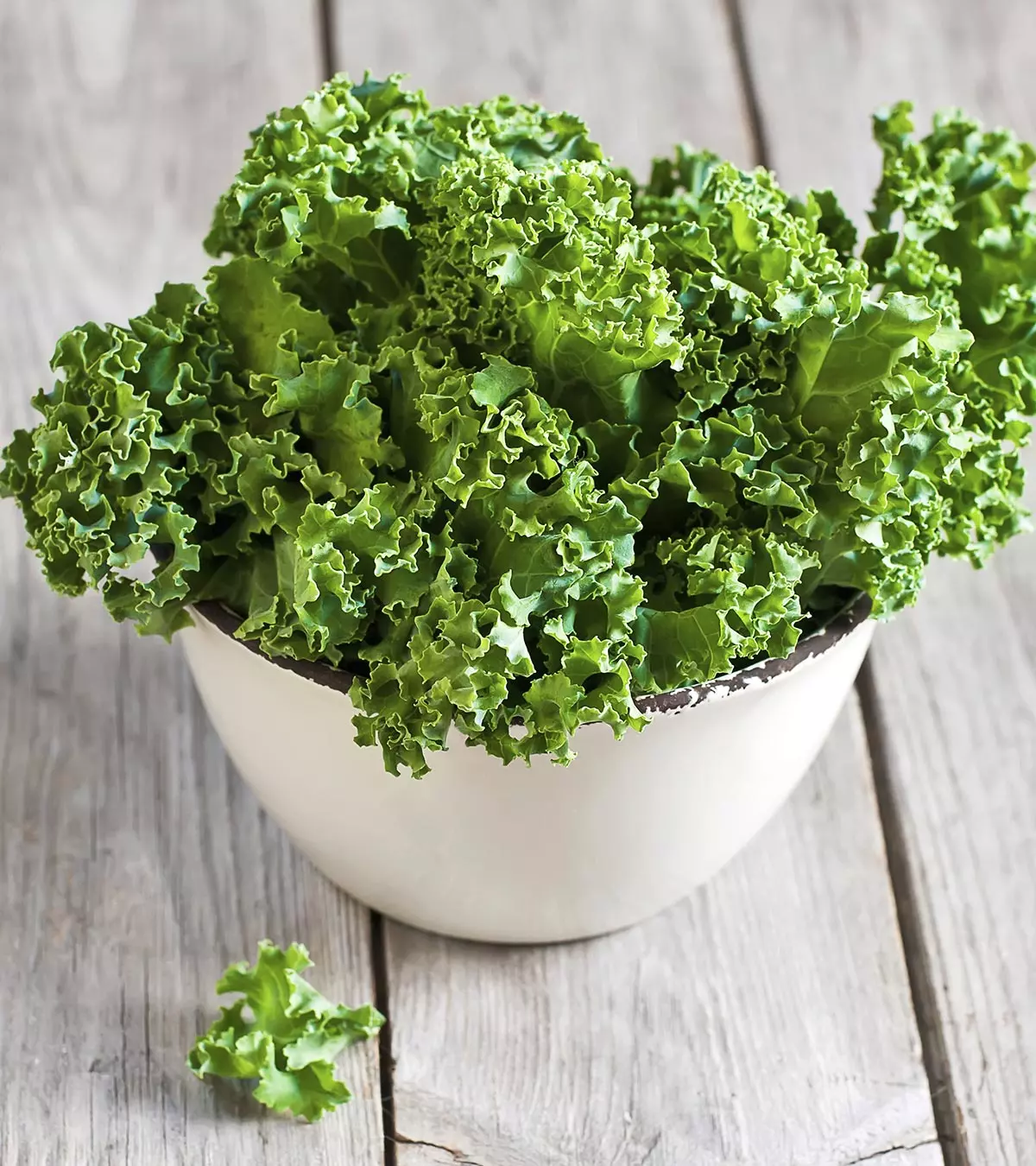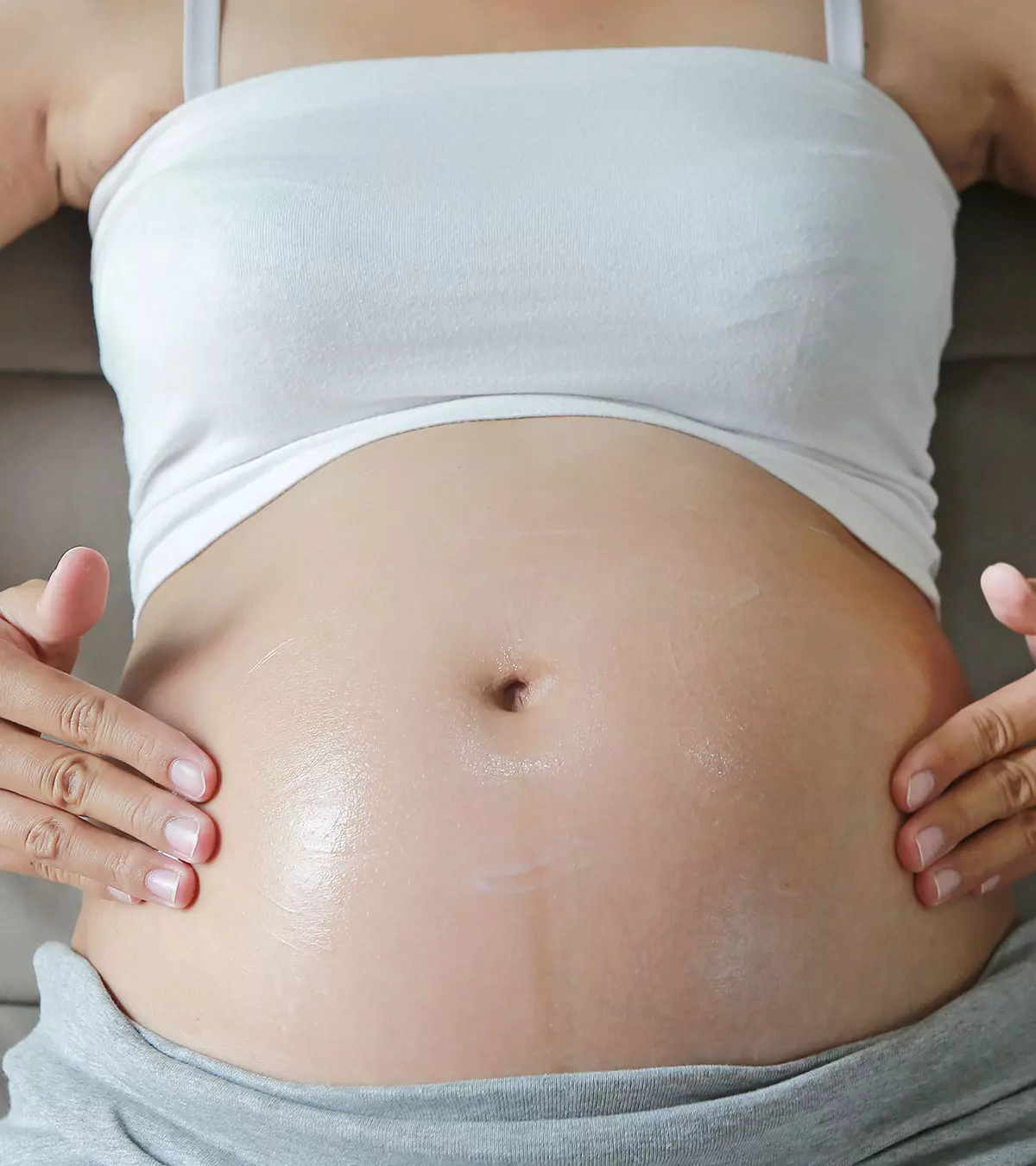
Image: Shutterstock
Dry skin during pregnancy is a common problem. The pregnancy glow due to rosy cheeks may make many women think skin can be smooth and glowing during pregnancy. However, skin itching and dryness are experienced by most expecting mothers. Pregnancy hormones make the skin more elastic to stretch the belly and accommodate the growing baby. The stretched skin may lose moisture and lead to dry skin.
Read on to know more about the causes, complications, treatments, and how to prevent dry skin during pregnancy.
Key Pointers
- Studies have shown that drying of skin during pregnancy is a common occurrence.
- Dehydration and changes in the hormonal levels are common reasons that lead to dryness of the skin.
- Excessive dryness, if not treated, might lead to eczema and other skin problems.
- Lukewarm showers, plenty of fluids, and other ways to deal with dryness have been mentioned below.
Is It Normal To Have Dry Skin During Pregnancy?
About 90% of women experience changes in their skin when they are pregnant. Some may have pre-existing skin issues, while others may develop new ones, mostly due to hormonal changes at the time (1). One such issue could be dry skin during pregnancy.
Whether you are pregnant for the first time or experiencing dryness of the skin for the first time during pregnancy, note that it could be normal and possibly a short-term condition that may go away after the delivery.
When And Where Does Dry Skin Appear?

Image: Shutterstock
Your skin, particularly around the belly, starts to feel dry during the second and third trimester (2). As your pregnancy progresses, the skin might feel dry on the face, arms, neck, breasts, and thighs.
Dry skin during pregnancy could be due to various reasons, which we see in the next section.
What Causes Dry Skin During Pregnancy?
The life developing in your womb brings many changes in your body, and some of them could be responsible for your dry skin.
- Your body requires more fluids when you are pregnant to improve the blood volume and pass oxygen. Lack of water or dehydration during pregnancy could make your skin dry.
 Point to consider
Point to consider- Changes in temperatures and weather, such as humidity and airflow, might result in skin dryness too. This usually happens during summers (3).
- Fluctuating hormonal levels during pregnancy could weaken or damage the hydrolipidic barrier that protects your skin surface. This may result in water evaporation from the body, leading to dryness of the skin.
- Excessive cleaning or washing of the skin could weaken the barrier and dry your skin. Pregnant women who have oily skin tend to wash the face again and again, which should be avoided.
- If you have hypothyroidismiFailure of thyroid glands to produce sufficient thyroid hormones, leading to weight gain, tiredness, skin, and other body changes. during pregnancy, your skin could be itchy, thick, and dry (4).

Image: Shutterstock
- Deficiency of vitamin A in the pregnancy diet could result in dryness and flaking of the skin (5). Therefore, doctors recommend the consumption of highly nutritious food while you are pregnant.
- Stretching of skin over your abdomen could also cause stretch marks and make your skin dry, leading to flaking and itching. However, it is temporary and could be treated easily.
Sometimes, dry skin during pregnancy could become a complex problem for some women.
How To Deal With Dry Skin During Pregnancy?
Here are a few things you might do at home to manage dry skin.
- Extremely cold or hot water could extract the moisture from your body, which otherwise keeps your skin supple. So, wash your face and take a shower with lukewarm water and see the difference.
- Drink adequate water and stay hydrated.
- Moisturize and hydrate your skin. Including hydrators and moisturizers in your skincare routine can help add moisture to the surface of your skin and prevent water loss. Add these in your routine skincare regimen to avoid dry skin.
- You may add essential oils to your bathing water as it might help reduce dryness of your skin.
- Cover your skin and use herbal sunscreen lotions when you go out in the sun. This might protect your skin during the summer.
- Include nutritious foods with healthy fats such as avocado, nuts, olive oil, canola oil, and leafy vegetables in your diet.
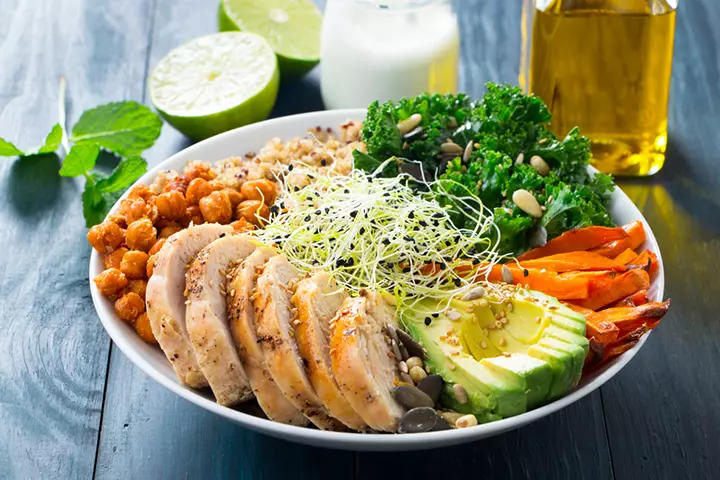
Image: Shutterstock
- If you live in a place that lacks moisture, you may put a humidifieriAn appliance that releases steam to enhance the moisture content of the air. in the room that might prevent excessive dryness of your skin.
- To protect your skin from irritation and sensitivity, it is recommended to use mild cleansers, particularly herbal ones.
If your skin isn’t dry, but you’re worried it could turn dry due to the weather or other factors, follow the preventive measures mentioned in the next section.
Can You Prevent Dryness Of Skin During Pregnancy?
There are certain things you do unknowingly to damage your skin, making it dry, itchy, and flaky. Avoiding them might help prevent dry skin.
- Try not to use chemical-laden soaps while you are pregnant as they could make your skin dry and flaky.
- Avoid taking steam as the technique might take away natural oils from your skin, making it dry eventually.
- Do not scratch your skin when it is itchy; it may cause more damage to your skin.
- Avoid excessive bathing or washing with soap, as it may make your skin dry.

Image: IStock
- Try to stay away from caffeinated drinks such as tea, coffee, and soda as these may dehydrate your skin.
- Chlorinated water could damage your skin and make it dry. When you are pregnant, avoid going into the swimming pool.
- Do not rub your skin harshly with a towel, pat dry instead.
If you notice dryness spreading all over your skin or the condition troubling you a lot, then home care alone may not be of help.
 Quick tip
Quick tipWhat Are The Complications Of Skin Dryness During Pregnancy?
Excessive dryness of skin during pregnancy, combined with some pre-existing skin conditions, can lead to a few skin problems such as (6).
- Eczema: In this chronic condition, the skin turns dry and flaky. The commonly affected areas include the legs, abdomen, neck, and arms. It could lead to red rashes and other skin problems if not treated. Timely diagnosis can help treat the condition with medications. According to the CDC’s National Center for Health Statistics 2021 report, approximately 8.9% of diagnosed cases of eczema were found in women, indicating their higher susceptibility to the condition.
- Prurigo: This condition is not so common during pregnancy, with the chances of 1 in around 300 pregnant women being affected. It usually occurs after the first trimester, when there are chances of the skin turning too dry (6).
- Other skin problems: Excessive dryness could be responsible for polymorphic eruptionsiA condition marked by a rash on the skin often triggered due to exposure to sun or artificial UV light. in pregnancy or pruritic urticarial papules and plaques of pregnancy (PUPPPiItchy and bumpy skin rashes that typically develop on a woman’s abdomen during the last trimester of pregnancy. ). These conditions would need a doctor’s consultation, followed by treatment.
The above conditions could make your skin itchy but try not to scratch as it could lead to scars and infections. Dry skin during pregnancy might not harm your baby. Also, it does not predict your baby’s gender. It is just a temporary discomfort and could be treated.
Read on to know when you must see a doctor about dry skin during pregnancy.
When To See A Doctor?

Image: IStock
When you are unable to treat your dry skin with home remedies, and the condition is becoming worse, consult a doctor. A visit to the doctor becomes necessary in the case of:
- Red rashes on your skin, with too much itching or swelling of the follicles.
- Bleeding or bacterial infection at the cracked skin.
- In the case of complications such as eczema, PUPPP, and prurigo, get the medications and treatment as soon as possible.
Frequently Asked Questions
1. Can I use exfoliants to treat dry skin during pregnancy?
Mild exfoliants, such as baking soda, may be used once a week during pregnancy. Other physical methods, such as body brushes or loofahs, may also be used for exfoliation.
2. Can I take supplements to help prevent dry skin during pregnancy?
Taking supplements without medical supervision is not recommended during pregnancy. If the problem is severe or due to any underlying condition, it is advisable to get treated for the same.
3. Can I use aloe vera to treat dry skin during pregnancy?
Yes, aloe vera has moisturizing and soothing effects when applied topically. It may be used to apply on the skin to treat dryness (9).
4. Can I use coconut oil to treat dry skin during pregnancy?
Yes, coconut oil is usually considered safe for topical application during pregnancy. It may be applied to soothe dry skin.
Dry skin during pregnancy usually results from inadequate hydration and certain nutritional deficiencies. Stretching of the abdominal skin with the growing baby bump can also make it dry and itchy. Avoid using excess soap for cleaning, skin products containing chemicals, hot or cold water for washing your skin, and protect it from harsh weather and sunlight. Include a rich moisturizer in your skin-care schedule and consume healthy fats in the form of nuts and natural oils. Despite taking all the essential pregnancy beauty tips, if the problem seems to aggravate and you experience excessive itching, rashes, swelling, or bleeding from the skin, you may consult a doctor.
Infographic: Management Of Dry Skin During Pregnancy
Although not serious, dry skin can make you itchy and irritated and add to pregnancy-related discomforts. However, knowing the causes behind its occurrence can help you deal with dry skin effectively. Scroll through the infographic below to discover the causes and remedies for dry skin.

Illustration: Momjunction Design Team
References
1. S. Kar, A. Krishnan, and P. V. Shivkumar; Pregnancy and skin; Journal of Obstetrics & Gynaecology of India (2012)
2. 3rd trimester: what to expect; Summa Health
3. A. J. Michels; Skin health; Oregon State University (2011)
4. Hypothyroidism and Pregnancy; Stanford Children’s Health
5. Vitamin A Deficiency; Cleveland Clinic
6. R. V. Vora et al.; Pregnancy and skin; Journal of Family Medicine and Primary Care (2014)
7. Dry Skin; Cleveland Clinic
8. Dry skin; DermNet
9. Aloe, Brigham and Women’s Hospital
Community Experiences
Join the conversation and become a part of our nurturing community! Share your stories, experiences, and insights to connect with fellow parents.
Read full bio of Dr. K. Harish Kumar
Read full bio of shreeja pillai
Read full bio of Rebecca Malachi
Read full bio of Reshmi Das












